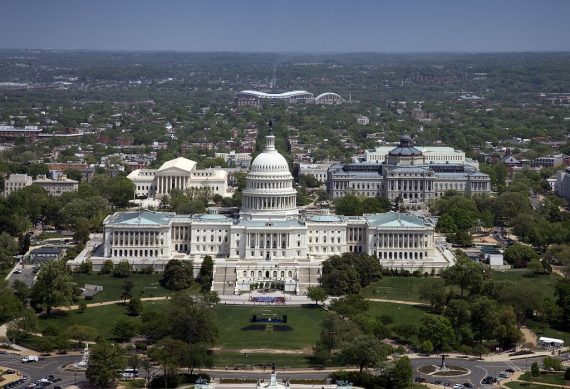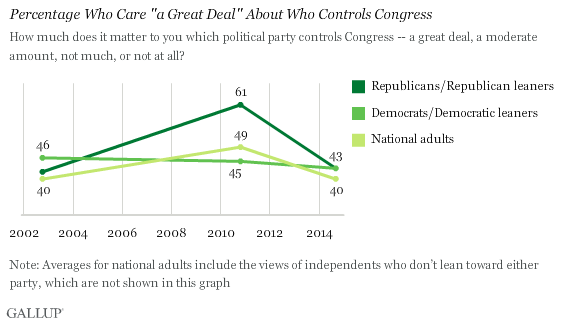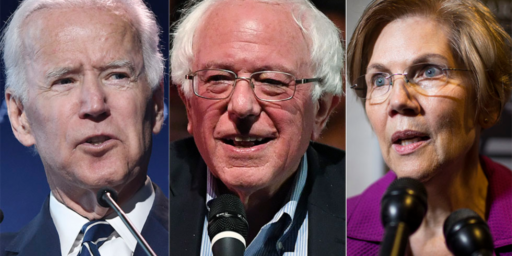Most Americans Don’t Care Very Much About Who Controls Congress
A majority of Americans don't care very much who controls Congress.
A new Gallup poll seems to indicate that a significant number of Americans don’t care very much about who controls Congress:
PRINCETON, NJ — Two months ahead of the midterm elections that may very well change the balance of power in Congress, four in 10 Americans say the specific party that controls Congress matters a great deal to them, while 29% say it matters a moderate amount and another 30% say it generally doesn’t matter to them.
The 40% of national adults now highly concerned about control of Capitol Hill equals what Gallup found a month before the 2002 midterms, but is lower than the 49% seen in late October 2010.
While the views of Democrats (including independents who lean Democratic) on this question have been steady across the three midterms — roughly 45% each year have said the party in control mattered a great deal to them — Republicans’ concern has varied. Currently, 43% of Republicans (including Republican leaners) say party control matters a great deal. It was a whopping 61% in 2010, but that was up from 42% in 2002.
The 2002 and 2010 elections were favorable to Republicans, as the GOP retained majority control of the U.S. House of Representatives and regained control of the Senate in 2002, and recaptured control of the House in 2010 with an enormous seat gain. Thus, while rank-and-file Republicans’ concern about party control is not nearly as high today as it was in 2010, when Democrats controlled both houses, it is comparable to 2002 — which could suggest that conditions are still favorable for the GOP. Missing from this midterm trend, however, is 2006, which was a strong Democratic year. Therefore, it is not entirely clear how levels of concern on this question relate to each party’s performance.
As this chart shows, these numbers generally have not changed much in the past several election cycles, although there has been a significant drop among Republican voters from the levels they were at in 2010:
The fact that Republican voters are saying that they don’t nearly as much as they did in 2010 about who ends up controlling Congress is, obviously, the most interesting in the poll. To some extent, I suppose, you could say that it is due to the fact that the GOP already has control of the House and is in no danger at all of losing that chamber this year. Beyond that, though, I’d speculate that after 2010 Republican voters, which includes much more than just the Tea Party base that has been the most vocal over the past four years, discovered that the enthusiasm of 2010 was somewhat misplaced. Notwithstanding the GOP’s huge victory that year, the party has largely failed to get its agenda adopted on a national level thanks to the fact that there’s a Democrat in the White House and that Democrats still control the Senate. Winning the Senate in November would give the GOP some additional leverage over legislation, but in the end their ability to accomplish much of anything will be limited by the fact that there is a Democrat in the White House at least until 2017, which means that there will have to be compromises made and deals struck in order to accomplish even the most basic tasks that Congress is responsible for, such as budgeting.
This means, of course, that 2016 is likely to be another closely fought ideological battle inside the GOP among Republicans on both sides of the “establishment v. Tea Party” divide for the Republican nomination. Indeed, given the fact that the GOP has lost four out of the last six Presidential elections, and lost the popular vote in five out of the last six, it’s likely that all parties of interest in the GOP are going to be highly interested in trying to win the White House back after eight years in the wilderness. As far as 2014 goes, though, Republicans don’t seem to be any more concerned about who controls Congress, and that suggests that while we’re likely to see Republican gains this year they will probably fall short of the wave we saw in 2010.
As for Americans as a whole, it’s not all that hard to understand why the partisan battle over Congressional control doesn’t grab the attention of the general public very much. Poll after poll over the past several years has shown that Congress has some of the lowest job approval numbers in its history. Going back to the Bush Administration, the institution has excelled at little more than partisan vitriol and gridlock, and that’s been with both parties controlling one or both chambers. It’s no surprise that they’d believe that it really doesn’t matter whose in charge in the current political climate, and in at least some sense they’re absolutely right.








That last paragraph of yours squeaks over the historic level of gridlock we’ve got going on now, doesn’t it?
Most Americans don’t care because they don’t understand the damage Republicans are doing to the Republic.
Whether it’s intentional economic sabotage, or climate change denial, or shirking their duty on immigration, or abdicating their responsibility in the ISIL fight…they are doing serious harm.
Now they have bagged everything and gone home until after the mid-term elections…meaning Congress will have been in session only 8 days between the end of July and mid-November.
And all for $174,000 a year.
Nice non-work if you can get it.
And they complain about welfare queens.
It would seem there is more than a little “both sides do it” or “their all alike” at play here, which only goes to show how ignorant the American electorate generally is.
“If voting made any difference they wouldn’t let us do it.”
― Mark Twain
Polling is always dicey on this topic because people tend to default to “both sides do it.”
Most Americans seem ambivalent when the question is posed generally, however if you pose it with respect to front-and-center issues – such as reproductive rights, war in ________, social security, medicare, ACA, etc – then they seem to care, right?
People don’t care until they … care.
Most Americans barely realize that there is a Congress or that the president cannot simply order that things be done.;
@Tillman:
Who cares about gridlock? The government still manages to spend more than $3 trillion a year. Still manages to employ a massive number of people (directly or indirectly). Still manages to make a massive number of transfer payments? The only thing gridlock seems to do is keep the Democrats from making a bigger issue of social engineering programs.
Many people aren’t interested in politics to begin with, can barely bring themselves to care about who is president (something like 40% of registered voters don’t even care enough to vote for that), and Congress is seen as minor leagues.
You wouldn’t know it from the various political sites (like this, or Salon, or National Review etc), but most people just aren’t political (or ideological). I’m not saying they shouldn’t be (obviously I’m interested myself), but that’s just the reality. And that includes some very well educated people; some of the most brilliant engineers and physicists I’ve known, who are typically actually reasonably well versed in what’s going on just because they’re intelligent and read a lot, are the most apolitical people I’ve ever talked to. They just don’t believe that anyone’s going to do more than fiddle with the fine settings on a system that is way out of tilt, and figure every politician is in it for themselves anyway (actually meeting with politicians, as many project engineers often do, does horrible things to ones belief in any party).
In fact, I suspect cynicism is the biggest driver of lack of interest in politics, rather than intelligence or knowledge – I’ve known more than a few people who’ve become less interested in politics when they started to get involved with it, typically dropping their involvement and often completely losing interest. What’s that they say about making laws and sausages?
A few years ago I read a poitical scientist saying there’s a deep, dark secret in PolySci that they all know, but no one wants to talk about. No matter what country you look at, or what point in history, “The electorate are a box of rocks.”
I’ve said for years that if the average middle aged guy took half the time he spends on sports and spent it on current events, history, econ; we’d have a completely different country.
@C. Clavin:
You forgot forcing children to eat dog food and throwing grandma out in the snow….
@gVOR08:
http://en.wikipedia.org/wiki/Rational_ignorance
People spend their limited pool of time on what they feel gives them the highest return, whether that be in money, emotional satisfaction, social interaction, etc. Current events and economics in the context of politics are pretty low on the list for most, especially when considering the feeling “there ain’t a dime’s worth of difference between the two parties.”
There’s a kind of paradox when it comes to voting: each individual voter’s vote is nearly worthless, but the aggregate of votes is very valuable indeed.
@Guarneri: Old people vote, so grandma is safe. I’m not sure about her grandchildren, though. 22% of American children live in families below the poverty line, and the last I heard Republicans want to cut the food stamp program. If I’m mistaken, correct me.
@Mikey:
Perhaps the solution is some sort of proxy system? Give voters the option to designate a third party who is authorized to vote on their behalf.
@gVOR08:
Every profession thinks that people not in their profession are woefully ignorant.
And just about every profession thinks that there’s is the most important. Being an engineer, I’d argue the biggest differences between us and say Roman times, in everything from standard of living to even spread of knowledge, is technology, so technology is the most important thing and one that everyone should spend all their time on (okay, I’m exaggerating a bit). Every profession can make a similar argument (there were many enjoyable evenings as a grad student arguing with poli-sci folks over whether science or politics were more important … and of course it was a pointless argument because they’re not mutually exclusive).
But then I remember what an old physics prof once told me – if people don’t find science interesting enough to bother reading up on (and everything from the sun down to plants down to our bodies runs on what science studies), then the fault lies in physicists for not making the case. People aren’t a box of rocks; experts are just horrible at explaining things, both in terms of creating interest and in terms of actually describing how things works. This is as true for politics as it is of science.
@Guarneri:
Not to nitpick, but, you got it backward and somewhat wrong:
It’s forcing grandma to eat cat food, and throwing children under the bus.
@C. Clavin: Damage to the Republic?
From the GOP?
Youre kidding, right?
@Eric Florack:
Specifically with regard to the GOP – where is he (C. Clavin) wrong?
@Guarneri:
You’re right…thanks.
@Eric Florack:
On which point, exactly, am I wrong?
@george: @Mikey: The guy who draws Dilbert had a thing about people being “in-duh-viduals”. He said most people are ignorant and perhaps stupid about a lot of things. It’s not that they’re stupid people, but as you say, they choose to expend their limited time and attention on other things.
So when I quote the guy saying the electorate are a box of rocks, it’s not to say they’re all stupid as individuals, but when they vote they are effectively a box of rocks. Not because they vote differently than I would, but because they base their votes on perceived tribal affiliation, sound bites from attack ads, physical appearance, obvious lies, and whatever else may have broken into their attention. My side as bad as anyone else.
It’s not a question of political scientists thinking people outside their field are “woefully ignorant”. They don’t expect them to know poly-sci. But they have studied why people vote as they do.
Yes, most people know nothing of physics, which is OK because they almost never need to. But although they know next to nothing about current events, public policy, economics, the law, or whatever; we expect them to vote every couple years. And no, the aggregate result is no better than the individual votes.
I’m not suggesting people be tested or something before being allowed to vote. I can’t think of any way to filter that wouldn’t be horribly abused. I’m not advocating anything, just commenting on the obvious realities of the situation.
@Stan:
Resolved: Free beer for everyone!
Well when you’re trying to agree on how best to fight a fire, and one side is perfectly happy let the whole thing burn down (and may even prefer it do so), that will happen.
@Guarneri:
I don’t know about you, but I see people every day – within shouting distance of the upscale neighborhood I live in – who are hungry and at the mercy of the elements. Republican policies have made their lives, which are already very hard, even more difficult.
@Guarneri:
You have my vote, Dear Leader.
@Guarneri:
Much cheaper than billions in corporate welfare and tax breaks for the folks at the top of the food chain.
@Eric Florack:
Damn straight. The trillions we spent to create the conditions that have given us ISIS were a great investment. Certainly better for the Republic than bullshit like schools, hospitals, and roads.
Let’s see. Since the Great Society the Democrats have had the Congress and presidency the majority of the time. We have transfer payment programs out the wazoo including food stamps at record highs, and the resulting financial affairs of the country in total disarray. The poverty rate is essentially unmoved. And speaking of corporate welfare, can your say GM, or Obama’ s donor list? And it’s all the republicans fault. Check.
I present you all with your diplomas in Democrat excuses and Obama sycophancy.
But I know. Hillary will finally fix it all…….
@Guarneri:
You know you guys are essentially arguing the same point, right? Just insert Cruz/Ryan/Whothefuckknows instead. Do you even have a point?
I’ll still take the free beer, though.
Well let’s see. When it comes to corporate lackyhood, the Democrats are a lot like the sleazy, drunk chick at the bar right before closing time – ready to be had & pretty damn easy.
Republicans, on the other hand, are naked in bed, buns up kneeling, with “do me any way you want to” tattooed on their asses…
So all our economic woes can be traced to anti-poverty problems? We must have never suffered from economic problems before LBJ. To be honest, the war on poverty has played its part. Johnson wanted guns, butter, and no tax increases. I think 1969 was the last year we were in the black. It’s noteworthy that you see that part food stamps and so on have played, but apparently not why pouring billions (or trillions) into a catastrophic war is a problem.
Personally, I would rather feed Americans than blow up peasants that are no threat to us.
@Guarneri:
Since LBJ left office the GOP has held the presidency what – 28 years? Democrats 18.
Why employ facts when you can just make stuff up?
@Guarneri: Wow! The most amazing non-sequiter that I have seen in a long time got an upvote. Beer–the great distractor.
@Guarneri:
You don’t seem to want to acknowledge the role that the 30 year long Republican war on the middle class has had….even as your facts are iffy.
@Guarneri: “We have transfer payment programs out the wazoo including food stamps at record highs, and the resulting financial affairs of the country in total disarray.”
You’re dealing in trivialities. Our problems are caused by technological advances that allow American companies to transfer manufacturing to China and other low wage countries and the abandonment of socialism by the same countries that allows them to participate in the world economy. The same thing happened earlier in the US when improvements in transportation made it possible for textile manufacturers to move their factories from New England to the South. Food stamps have nothing to do with American industrial decline. They’re a symptom, not a cause.
You ought to read “The Pride and the Fall: The Dream and Illusion of Britain As a Great Nation” by Corelli Barnett (http://tinyurl.com/ncvy6hx). Barnett is not a socialist, and he has little good to say about Great Britain’s welfare state. But his rage is directed elsewhere, at a complacent British managerial class that refused to invest in education and infrastructure and valued short term profits over improving British manufacturing techniques. Some of his criticisms don’t apply to the US. There’s no danger here of our financial masters neglecting their work out of too high a regard for culture and the enjoyment of leisure. But I think he’s right on his major points. China is to the present day US as Germany and the US were to Great Britain in the late 19th and early 20th centuries. They’re cleaning our clock, and we’re not going to get back in the game by cutting food stamps or by privatizing Medicare.
@gVOR08:
I’m not sure we can do much besides tinker around the edges. It’s a system devised and operated by humans, with all the human flaws.
Still, as Churchill is reputed to have said, despite its failings it is the best of the available choices. (“It has been said that democracy is the worst form of government except all the others that have been tried.”)
Hi there would you mind letting me know which web host you’re
utilizing? I’ve loaded your blog in 3 completely different browsers
and I must say this blog loads a lot quicker then most.
Can you recommend a good internet hosting provider at a fair price?
Thanks, I appreciate it!
@gVOR08:
Actually I’d argue that the choice given to most people politically is more or less the same one given them as scientists/engineers – they’re given a choice between models designed and presented to them by experts (ie Democrat model vs Republican model).
And I’m not sure the consequences of the political choice are bigger – if for instance everyone choose the more fuel efficient, pesticide free etc technology it would solve many of our most serious societal problems.
Of course, these aren’t mutually exclusive; elections have consequences, and so do purchases (its mainly consumer purchases that drive technology, both in its discovery and implementation). The consequences of lack of knowledge in either are pretty serious, on the lines of if you know that there’s a big waterfall ahead on the river you’re rowing down, most would modify their course.
@Stormy Dragon:
Perhaps we could call those proxy voters congresspeople and senators.